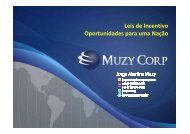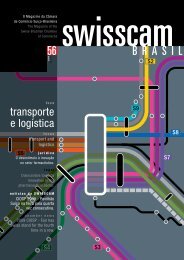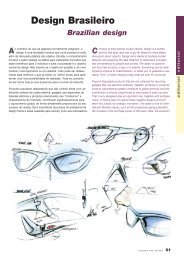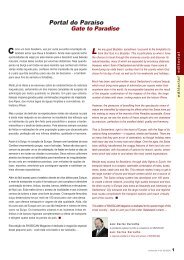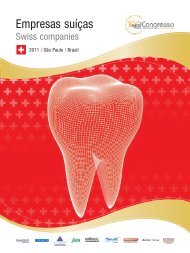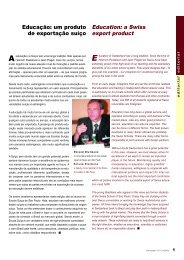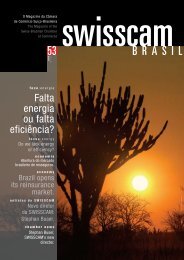01 Logística e Infra-estrutura no Brasil – Desafios e ... - Swisscam
01 Logística e Infra-estrutura no Brasil – Desafios e ... - Swisscam
01 Logística e Infra-estrutura no Brasil – Desafios e ... - Swisscam
Create successful ePaper yourself
Turn your PDF publications into a flip-book with our unique Google optimized e-Paper software.
The bureaucratic<br />
obstacles that hinder<br />
Brazilian foreign trade<br />
Brazil is seen as one of the most inefficient<br />
countries in terms of foreign trade operations.<br />
Comparing to global standards, twice as much<br />
time is necessary to transport a product from<br />
one point to a<strong>no</strong>ther<br />
I<br />
mport and export operations in Brazil<br />
are marked by excessive bureaucracy,<br />
slowness, strikes, and losses for companies.<br />
Brazil is seen as one of the most inefficient<br />
countries in terms of foreign trade operations.<br />
Comparing to global standards, twice<br />
as much time is necessary to transport a<br />
product from one point to a<strong>no</strong>ther. As Brazil<br />
started eliminating its trade barriers only in<br />
the early 90’s and engaged in exporting<br />
transactions only in the mid 80’s, the country<br />
has been slow to adjust to the new scenario.<br />
Besides that, the procedures set by governmental<br />
agencies for foreign trade transactions<br />
are still too complex, and entrepreneurs<br />
have a hard time to understand the gobbledygook.<br />
Brazil has been slow to<br />
adjust to the new scenario,<br />
and the procedures set by<br />
governmental agencies for<br />
foreign trade transactions<br />
are still too complex<br />
by Cristia<strong>no</strong> Koga<br />
customs authorities, generating high additional<br />
costs. Panalpina has 500 employees in<br />
Brazil, 70 of which work at the Port of Santos,<br />
and approximately 50 at the Viracopos and<br />
Guarulhos airports.<br />
Customs offices have been unable to keep<br />
up with the new standards and to provide<br />
clear information about importation procedures<br />
to users. In addition, Brazilian laws<br />
can<strong>no</strong>t deal with the large number of products<br />
crossing our borders, and the SISCOMEX<br />
support system, which should make the<br />
process easier, still has gaps. Moreover, the<br />
clearing system is obsolete, import taxes are<br />
high, and there are additional fees charged<br />
under different names, besides port and<br />
airport expenses. Also worth mentioning are<br />
the import/export barriers, especially in the<br />
textile and shoe sectors, in which products<br />
are classified as belonging to the “grey<br />
channel”, a class of goods that are meticulously<br />
controlled by customs officials.<br />
SMEs are <strong>no</strong>t ready to engage in export<br />
operations. They are <strong>no</strong>t familiar with export<br />
procedures, feel insecure to start exporting,<br />
k<strong>no</strong>w very little about international quality<br />
standards, and resist the idea of having to<br />
change their products to meet the requirements<br />
of the global market. To make things<br />
worse for these SMEs, there is a lack of<br />
incentives and support in terms of, for example,<br />
access to credit and commercial<br />
missions abroad. In general, the government<br />
makes this kind of support available only to<br />
large companies. Institutions like SEBRAE,<br />
FIESP, and APEX assume partially this paper,<br />
but the result is <strong>no</strong>t yet significant. All<br />
these bottlenecks and unnecessary complications<br />
affect Brazil’s ability to increase its<br />
exports and become a big global player.<br />
Besides <strong>no</strong>t yet being familiar with the export<br />
culture, companies, especially small and<br />
medium-sized enterprises, additionally have<br />
to face high freight and port costs. Furthermore<br />
the unfavorable exchange rates do <strong>no</strong>t<br />
help exportations. Companies lose competitiveness<br />
in the global markets and a large<br />
number of contracts are cancelled due to the<br />
higher prices in dollar, a fact that diminishes<br />
Often custom officials themselves<br />
do <strong>no</strong>t have e<strong>no</strong>ugh<br />
k<strong>no</strong>wledge to evaluate the<br />
various kinds of products<br />
been imported or exported<br />
exportations and can create a lack of vessels<br />
and containers, as it happened in 2004, due<br />
to the lack of profitability of operations in<br />
ports with few freight tur<strong>no</strong>ver.<br />
Other problems include the lack of infrastructure<br />
characterized by inefficient ports,<br />
deficient roads, and underused railways and<br />
waterways. The high interest rates also<br />
contribute to put off entrepreneurs who would<br />
foco<br />
focus<br />
As a company dedicated to handling imported<br />
and exported goods all the way between<br />
Brazil and the rest of the world, Panalpina,<br />
present in the country for 29 years, has the<br />
necessary experience and a long-standing<br />
relationship with agents and technicians<br />
from various governmental agencies. As<br />
there are different and complex rules, such<br />
as those established by ANVISA for the<br />
chemical, medical, pharmaceutical, and<br />
agricultural sectors, logistics solutions must<br />
meet each sector’s specific needs. Often<br />
custom officials themselves do <strong>no</strong>t have<br />
e<strong>no</strong>ugh k<strong>no</strong>wledge to evaluate the large<br />
number of products entering or leaving the<br />
country. Consequently, companies must<br />
send their own engineers and specialists to<br />
explain and answer the questions asked by<br />
swisscam nº44 03/2006<br />
17




